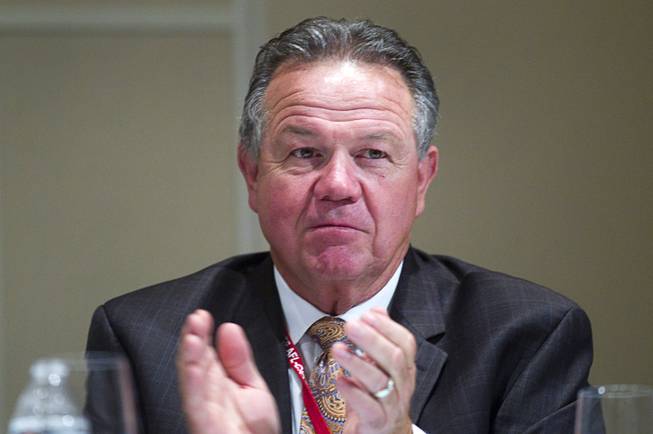
Danny Thompson, head of the state’s AFL-CIO, applauds a speaker during the Nevada State AFL-CIO convention at the Excalibur Tuesday, Aug. 20, 2013.
Wednesday, Aug. 28, 2013 | 2 a.m.
The state teachers’ union is finding few friends to help it convince voters that they should approve a 2 percent business margins tax in 2014.
Although the union claims the tax would inject about $800 million into a school system that they and their Democratic allies have repeatedly said is underfunded, few elected Democrats are openly advocating for the passage of this tax measure on the 2014 ballot.
Now, an early sponsor of the Education Initiative campaign has signaled that it may not sign on to the campaign to pass the tax.
The Nevada State AFL-CIO, a group of dozens of affiliated unions, said last week that it’s weighing its options after hosting its annual conference.
"The Nevada State AFL-CIO has not taken a position on the tax initiative that will be on the ballot in 2014,” said AFL-CIO leader Danny Thompson in an email to the Sun. “The measure needs to be studied for its impact on our members and its impact on our jobs in our community. No decision will be made until the Nevada State AFL-CIO's Committee on Political Education (COPE) Convention in April of 2014.”
The statement is a departure from Thompson’s past vocal support of the measure.
The state teachers’ union, the Nevada State Education Association, has routinely listed the Nevada State AFL-CIO as its chief partner: First, in pushing to qualify the initiative for the 2014 ballot and then, advocating for its passage into law.
Journalist Jon Ralston asked Thompson, on Feb. 13 what his position was on the tax.
“Do you support the margins tax?” Ralston said. “Just say ‘yes’ or ‘no.’ Come on, tell me.”
“Without some change, I support the margins tax,” Thompson said, noting at that time that the Legislature could pass the initiative into a law, a decision legislators ultimately did not make. “I mean, at the end of the day, we have to do something.”
In addition to telling Ralston he supported the margins tax, Thompson also testified on March 5 in support of the tax at the Nevada Legislature.
The teachers’ union also says on its website that the margins tax or Education Initiative is “sponsored by the Nevada State Education Association and the Nevada State AFL-CIO.”
Now AFL-CIO representatives are taking a step back.
“We have to see what this new initiative does as far as impacting our ability for our members to have access to jobs,” said Anthony DeAngelo, Nevada State AFL-CIO spokesman.
Union leaders have long been frustrated by the inability of the Legislature to pass a tax increase, in part because it requires a two-thirds majority vote.
Voters approved an amendment to the state constitution in 1996 that instituted the two-thirds requirement.
Following the 2011 legislative session, political observers counted Thompson as an early advocate for a tax measure that would be put to a direct vote of the people as a way to bypass what advocates for more education funding considered an insurmountable logjam at the Legislature.
Thompson told the Sun in early 2012 that the Nevada State AFL-CIO was collecting signatures to qualify a tax proposal for the ballot. Ironically, it was the state teachers’ union who appeared hesitant to join the AFL-CIO’s effort at that time.
In June, 2012, Thompson joined an Education Initiative PAC that would advocate for the ballot measure.
The next day, Thompson joined the teachers’ union in launching the quest to gather enough signatures to qualify the tax proposal for the 2014 ballot.
"Without a stable, predictable and consistent funding source politicians will continue to play political games with education funding,” Thompson said at the time. “This initiative will put an end to that nonsense.”
Although the initial ballot measure suffered a defeat in court, the description of the tax — “a 2 percent business margins tax that will be levied on business revenue that is not offset by either cost of goods or payroll costs” — is similar to what voters will see on their ballots in 2014.
By late 2012, it was the teachers’ union that eventually took the helm in collecting signatures for the ballot measure, an effort in which the AFL-CIO did not participate.
This month, Thompson was removed from the list of officers on the Education Initiative PAC.
Ruben Murillo, head of the Nevada State Education Association, said he understands that the AFL-CIO must go through its process to endorse the ballot initiative.
“We don't expect the Nevada State AFL-CIO to deviate from its policies and procedures,” he said.
The Culinary Workers Union Local 226 also goes through the same formal endorsement process, said Yvanna Cancela, the culinary union’s political director.
For that reason, the Nevada State AFL-CIO said any past statements or actions in support of the initiative aren’t official.
“The stance is still very much that we want to see education funded,” DeAngelo said. “This is now a matter of making sure that our affiliates want to or are ready to and would agree to putting muscle behind this and putting investment and resources and fully endorsing this. That’s all. It’s just part of the process. We have to make sure that this initiative is good for our members and is good for jobs. That is what we’re going to be looking at in coming months.”

Join the Discussion:
Check this out for a full explanation of our conversion to the LiveFyre commenting system and instructions on how to sign up for an account.
Full comments policy